The Prophet of Mercy Website
Muslim World League - Global Commission for Introducing the Messenger
Muslims have always been encouraged to learn and recite some of the invocations that were taught or spoken by the Messenger of Allah, not only because his words are concise, comprehensive and linguistically eloquent, but because obviously, he was the one most knowledgeable about how the Creator of the universe should be addressed. Of additional importance is the Prophet's manner when addressing his exalted Lord: his humbleness and sincerity, his acknowledgement of human imperfection, his gratitude for favors and blessings, his presence of mind and concentration, his urgency and polite persistence and his trust in the wisdom and response of Allah. This too represents a significant feature of the Sunnah.
When utilized correctly, supplication is an effective instrument for the acquisition of what is desired and prevention of what is feared. Information and instruction on this subject was offered by the Messenger of Allah: Nothing repels fate except supplication...[1] Whoever would like Allah to respond to him during hardship and disaster should supplicate much in times of ease.[2]
Three supplications are answered: the supplication of one who is fasting, the supplication of one who has been wronged and the supplication of a traveler.[3] Three supplications are answered without doubt: the supplication of one who has been wronged, the supplication of a traveler and the supplication of a parent for his child.[4]
Do not supplicate against yourselves and do not supplicate against your children and do not supplicate against your servants and do not supplicate against your properties.[5] Do not supplicate for death and do not wish for it. But whoever must, let him say, "O Allah, give me life as long as life is best for me and cause me to die when death is best for me."[6]
It is evident, however, from both the Prophet's biography and the early history of Islam that the Sunnah does not advocate supplication alone. Rather, it is required in conjunction with adequate effort based on sound knowledge. Both physical effort and supplication are causes and means of obtaining the desired effect in any endeavor, and neglect of either one will weaken the force that determines an outcome. For example, forgiveness of sin cannot be obtained except by repentance, regret and determination never again to return to the offense in addition to prolonged, sincere supplication to Allah for His forgiveness. And any project undertaken requires a sufficient amount of planning, preparation and hard work accompanied by supplication to Allah. Similarly, the perceptive believer seeks refuge in Allah from evil while doing his utmost to avoid it; and he asks Allah for Paradise while striving hard to attain it through righteous actions.
Allah's Messenger made maximum use of supplication as an essential supplement to his best efforts according to the law of cause and effect. His method was to strive hard while calling upon Allah for support and assistance, since proper action and persistent supplication are among the most powerful causes of success. So he asked and worked, implored and labored; and then he was answered and aided.
From time to time, Allah tests the patience of His servants by prolonging difficult conditions. When nothing more can be done by a person to alter a situation, the aid of Allah should be sought through fervent supplication. One should never discontinue supplication thinking that response is slow or not forthcoming, for He will surely respond. Allah is pleased by continuing supplication which shows trust in Him; He rewards for it, provides psychological relief and responds in the way which He knows will be best. As His Messenger explained:
No Muslim supplicates to Allah with a supplication that is free from sin and from that which severs ties of relationship but that Allah will give him one of three things: a direct response to his supplication or the accumulation of its reward for him in the Hereafter or the prevention of an evil from striking him which is equal to it [i.e., to his effort in supplication].[7]
He further disclosed, "The closest a servant can be to his Lord is when he is prostrating [in prayer], so [at that time] supplicate abundantly."[8] Though Allah is exalted and high above His creation, the Muslim draws nearest to Him by lowering his face to the ground in sincere worship and humble submission. At such a time his supplication is even more likely than usual to earn response.
The words of prophetic supplication obviously reflect the ideal relationship between a devout, dedicated man and his Creator. But they are much more than eloquent expression and moving sentiment. They reveal an inner dimension of the Sunnah which provides guidance and direction for every person's life. What the Prophet requested from his Lord is everything meaningful, valuable and worthwhile in both the present life and that to come. In addition, he knew the subtle aspects of evil from which to seek protection from his Lord.
Allah's Messenger knew exactly what to ask for and how to ask for it. Examination of this element of the Sunnah will reveal unmistakably what everyone should try to avoid because of its harm as well as the noble objectives that should be desired, sought after and worked for by every believer, in fact, by every human being on earth.
The Messenger of Allah identified these objectives and made them known to others through his own supplications, which were noted attentively by his companions, memorized and then taught as a part of the dynamic Sunnah that went on to civilize the world. He would humbly praise and then address his Lord:
O Allah, I am Your servant, the son of Your male servant and Your female servant. My forelock is in Your hand. Your decision is being carried out in me. Your decree on me is justice. I ask You by every name of Yours, which You have named Yourself or revealed in Your Book or taught any one of Your creation or kept within Your knowledge of the unseen, to make the magnificent Qur'an the revival of my heart, the illumination of my breast, the removal of my sadness and the departure of my worry.[9]
O Allah, forgive me, have mercy on me, guide me, grant me well-being and provide for me.[10] O Allah, set right my religion, which is the safeguard of my affairs, and set right my world, wherein is my livelihood, and set right my hereafter, to which is my return. And make life for me an increase in all good and make death for me a relief from every evil.[11]
My Lord, assist me and assist not others against me. Grant me victory and grant not victory to others over me. Plan in favor of me and plan not for others against me. Guide me and make guidance easy for me; and aid me against whoever should oppress me. My Lord, make me one who continually remembers You, who is continually grateful to You, who continually fears You, who continually obeys You, continually praying and returning to You. My Lord, accept my repentance, remove my offense, respond to my supplication, establish my evidence, guide my heart, direct my tongue and eliminate resentment from my breast. O Allah, inspire me to sensible conduct and protect me from the evil of my soul.[12]
O Allah, conceal my faults and remove my fears. O Allah, guard me from before me and behind me, on my right and on my left and above me. And I seek refuge in Your grandeur from being seized unaware from below.[13]
O Allah, grant my soul consciousness [of You] and purify it, for You are the best to purify it. You are its protector and guardian.[14] O Allah, I seek refuge in You from laziness, decrepitude, debt and sin.[15] O Allah, I ask You for guidance, righteousness, chastity and self-sufficiency.[16]
O Allah, I seek refuge in You from the evil of what I have done and from the evil of what I have not done.[17] O Allah, I seek refuge in You from the distress of trial, from the lowest level of misery, the perversity of fate and the malicious rejoicing of enemies.[18] O Allah, make not our misfortune in our religion and make not the world our greatest concern nor the sum of our knowledge.[19]
O Allah, I seek refuge in You from knowledge that does not benefit, from a heart that is not humbled, from a soul that is not satisfied and from supplication that is not answered. O Allah, I seek refuge in You from the cessation of Your favors, from a change in the well-being You have given me, from Your unexpected vengeance and from all that angers You. O Allah, director of hearts, direct our hearts toward obedience to You.[20]
O Allah, grant us a fear of You [sufficient] to prevent us from disobeying You, and obedience to You enabling us to reach Your Paradise, and the certainty which renders disasters of this world unimportant to us. O Allah, let us enjoy our hearing, our sight and our strength as long as You grant us life, and make it remaining among us. Make our vengeance upon those who oppress us and support us against our enemies. Let not our misfortune be in our religion and let not the world be our greatest concern or the limit of our knowledge. And do not empower over us those who show us no mercy.[21]
O Allah, I seek refuge in You from bad manners, deeds, desires and diseases."[22] O Allah, I seek refuge in You from anxiety and grief, from failure and laziness, from cowardice and stinginess, from the constriction of debt and being overpowered by men. And I seek refuge in You from the torment of the grave and from the trials of life and death.[23]
O Allah, I hope for Your mercy, so leave me not to myself for even the wink of an eye. And amend for me all of my affairs. There is no god but You.[24] O Allah, make sufficient for me what You have permitted so I may avoid what You have prohibited, and make me self-sufficient by Your favor so I may need no one but You.[25]
O Allah, forgive me what I have done and what I have delayed, what I concealed and what I revealed, the excess I have committed and that of which You are more knowing than me.[26] O Allah, forgive me my sin, all of it; the minute and the obvious of it, the first and the last of it, the apparent and the secret of it.[27]
O Allah, I ask You for all goodness, what I know of it and what I do not know; and I seek refuge in You from all evil, what I know of it and what I do not know. O Allah, I ask You of Your favor and mercy, for none possesses them but You.[28] O Allah, I ask You for useful knowledge, for lawful sustenance and for work acceptable to You.[29] O Allah, I ask You to grant me the performance of good deeds and the abandonment of bad ones, love of the poor and Your forgiveness and mercy. And if You intend a trial for people, let me die without having failed in trial.[30]
I seek refuge in Your approval from Your anger and in Your pardon from Your penalty. I seek refuge in You from You. I cannot adequately praise You; You are as You have praised Yourself.[31]
O Allah, You created my soul and it is You who will take it; to You belongs its death and its life. O Allah, if You should keep it alive then safeguard it, and if You should cause it to die then forgive it. O Allah, I ask You for freedom from all evil.[32] O Allah, make the best of my days the Day when I meet You, the best of my life the last of it and the best of my deeds the final ones.[33]
These are but a few of the supplications that offer a glimpse into the heart of the final Prophet and reflect his aspirations for his followers and their future generations. Like all other prophets, he was a human being, and despite his extraordinary accomplishments, never claimed divine status. He called people to the worship of God alone, and insisted they refer to him as "Allah's servant and messenger". Through obedience and selflessness, effort and reliance on Allah, he and his companions built a society based upon principles of strong faith and morality combined with those of material progress - one unequaled in the history of mankind.
------------------------------
[1] Narrated by at-Tirmidhi and al-Hakim - hasan. This means that a destiny which might have been, had Allah not willed to prevent it, is changed by Him due to the supplication of His righteous servant (of which He had previous knowledge).
[2] Narrated by at-Tirmidhi - hasan.
[3] Narrated by al-Bayhaqi - saheeh.
[4] Narrated by Ibn Majah - hasan. These three are given by way of example, not limitation.
[5] Narrated by Muslim and Abu Dawud.
[6] Narrated by an-Nasa'i - saheeh.
[7] Narrated by Ahmad - hasan.
[8] Narrated by Muslim.
[9] Narrated by Ahmad - saheeh.
[10] Narrated by at-Tirmidhi, Abu Dawud and Ibn Majah - saheeh.
[11] Narrated by Muslim.
[12] Narrated by Abu Dawud, at-Tirmidhi, an-Nasa'i and Ibn Majah - saheeh.
[13] Narrated by Abu Dawud - hasan.
[14] Narrated by Muslim.
[15] Narrated by Muslim.
[16] Narrated by Muslim and at-Tirmidhi.
[17] Narrated by Muslim.
[18] Narrated by al-Bukhari and Muslim.
[19] Narrated by at-Tirmidhi and al-Hakim - saheeh.
[20] Narrated by Muslim.
[21] Narrated by at-Tirmidhi - saheeh.
[22] Narrated by at-Tirmidhi - saheeh.
[23] Narrated by al-Bukhari and Muslim.
[24] Narrated by Abu Dawud - hasan.
[25] Narrated by at-Tirmidhi - hasan.
[26] Narrated by al-Bukhari and Muslim.
[27] Narrated by Muslim.
[28] Narrated by at-Tabarani - saheeh.
[29] Ibn Majah - hasan.
[30] Narrated by al-Bazzar - hasan.
[31] Narrated by Muslim.
[32] Narrated by Muslim.
[33] Narrated by al-Bukhari and Muslim.
******







